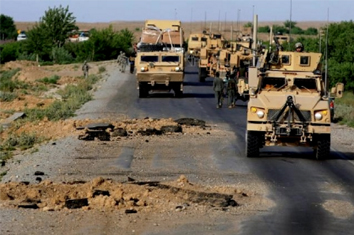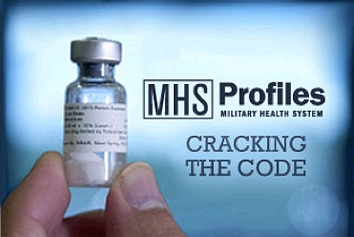| Welcome  Every August, the Department of Defense and the Military Vaccine Agency partner with the Centers for Disease Control and Prevention to support National Immunization Awareness Month. This year’s theme, “Immunization Health and the DoD Family,” was adopted to help educate beneficiaries and heighten awareness of the importance and benefit of maintaining up-to-date vaccinations. DoD will continue to emphasize immunization health and other long-held principles in August, as well as during the 2010-2011 seasonal influenza vaccination campaign. Vaccinations and other preventive health measures such as frequent hand washing, sneezing into one’s sleeve and avoiding close contact with sick people continue to provide the best protection against influenza and other communicable diseases. Simply put, these efforts are force multipliers. Throughout the years, the DoD has consistently improved its influenza vaccination compliance rate, and this year’s aim is no different. Commanders and leaders at all levels will continue to emphasize the importance of vaccination as early as possible, ensuring increased immunity prior to the influenza season hitting its peak. MILVAX promotes excellence in immunization delivery and offers many training opportunities for health care providers, commanders and service members to keep them current on changes in policy and new initiatives. These training sessions, offered in person and online, serve as valuable sources of up-to-date information, resources and coordination of policy across the services. MILVAX’s website, www.vaccines.mil is a comprehensive access point for this information. The top priority is to ensure the health and well-being of the DoD family, and quality immunization programs are key to fulfilling that priority. Enjoy this issue of MHS Vital Signs! Col. Michael Krukar
Director, Military Vaccine Agency August Is Immunization Awareness Month  Proper immunization is an essential component of good, preventive health care because it can provide continuous protection against vaccine-preventable diseases. These diseases include, but are not limited to, hepatitis, tetanus, typhoid, measles, mumps and rubella. Vaccinations are particularly important for at-risk populations, including service members, new mothers, infants, school-aged children and senior citizens. The priority vaccinations for each group are different and depend on age, lifestyle, and occupational factors, among other things. Regardless, everyone can benefit from keeping their vaccinations current and their immunization records up to date. Read more Mullen: Military Needs Leaders to Address Suicide Issue  Leadership and the effects it can have to help bring down the suicide rate were among the topics the chairman of the Joint Chiefs of Staff recently discussed with service members in Camp Red Cloud, South Korea. Navy Adm. Mike Mullen spoke to 2nd Infantry Division soldiers about the stresses the Army is under after almost nine years of war. He took time from participating in high-level meetings in Seoul to meet with more than 200 soldiers and airmen. Mullen said the suicide issue is not going to just magically disappear – it is a tragedy that leaders at all levels must address. “We can’t just keep reading the numbers every single month. They just keep going up,” he said. Read more Warrior Care Spotlight: Double Amputee Takes Charge of Army Wounded Warrior Program  The U.S. Army Wounded Warrior Program gained a new director July 13 – one who has a lot in common with those he'll be leading. Lt. Col. Gregory D. Gadson, a West Point graduate, lost both of his legs to a roadside bomb in Iraq in 2007. Despite nearly losing his life, Gadson went on to complete two graduate degrees and recovered with assistance from the Wounded Warrior Program, which he now leads. Read more Like “Running on the Moon”: Brigade Uses New Technology to Advance Soldiers' Rehab  Fort Jackson soldiers who are injured during basic combat training have a new weapon at their disposal to get up and running again. The 171st Infantry Brigade recently purchased three anti-gravity treadmills, which are designed to rehabilitate runners who have injuries to the lower back, legs or feet. The machines allow injured soldiers to train while putting less weight on the injured area by creating negative air pressure. The negative air pressure is adjustable and simulates the effect of walking or running in an environment with as little as 20 percent of the Earth's gravity. Read more New Policies Protect Troops From Mild Traumatic Brain Injuries  Army Chief of Staff Gen. George W. Casey Jr. has sent a message to commanders throughout the force to reinforce new policies designed to minimize the effects of mild traumatic brain injuries. Mild traumatic brain injuries are more commonly known as concussions. Explosions on the battlefield often cause these injuries, but they also can occur through falls, sports injuries, auto accidents or any other event resulting in a blow to the head. The policies require any soldier who sustains a direct blow to the head or loss of consciousness; is within 50 meters of a blast (inside or outside); is in a vehicle associated with a blast event, collision, or rollover; is dismounted within 50 meters of a blast; or is in a building or vehicle damaged by a blast/accident to undergo a medical evaluation, followed by 24 hours of downtime and medical clearance before returning to duty. Read more MHS Profiles: Cracking the Code – DoD’s Quest for a Malaria Vaccine  This month we profile the United States Military Malaria Vaccine Program, which hopes to unravel the major complexities of the malaria parasite to develop a vaccine that will control and someday eradicate the disease. Read more Research Roundup  Research, medical publications and articles from peer-reviewed medical and scientific journals are a vital part of the Military Health System. Each month, MHS Vital Signs highlights notable research being conducted by the MHS and its counterparts. USU Researchers Break New Ground in Prostate Cancer Battle A recent medical breakthrough has opened new opportunities in clinical evaluation of prostate cancer worldwide, as military researchers have developed a new process that may lead to earlier detection of the disease, according to officials. Dr. Shiv Srivastava, co-director of the Uniformed Services University’s Center for Prostate Disease Research and CPDR Director Col. (Dr.) David G. McLeod recently collaborated with a team of researchers and investigators from the Armed Forces Institute of Pathology and Walter Reed Army Medical Center to develop a highly specific assay, or analysis, for the detection of the ERG oncoprotein, which is regulated by prevalent gene fusions present in more than half of all prostate cancers. Read more Did You Know?  A new website design at www.tricare.mil gives beneficiaries a faster, more personalized way to get the TRICARE information they need. The redesign includes improvements to the profile entry field, as well as new sections such as “New to TRICARE,” “Crisis Center” and “Quick Links.” A new website design at www.tricare.mil gives beneficiaries a faster, more personalized way to get the TRICARE information they need. The redesign includes improvements to the profile entry field, as well as new sections such as “New to TRICARE,” “Crisis Center” and “Quick Links.”
The improved profile entry feature makes it easier and faster for beneficiaries to answer three simple questions about their status, location and health care plan to bring up information specifically tailored to them. Read more 
The Military Health System (MHS) is a unique partnership of medical educators, medical researchers, and health care providers and their support personnel worldwide. The MHS is prepared to respond anytime, anywhere with comprehensive medical capability to military operations, natural disasters and humanitarian crises around the globe, and to ensure delivery of world-class health care to all DoD service members, retirees, and their families. To subscribe, unsubscribe, or manage your e-mail subscription options, including your preference for text or HTML formatted e-mails, click here. |